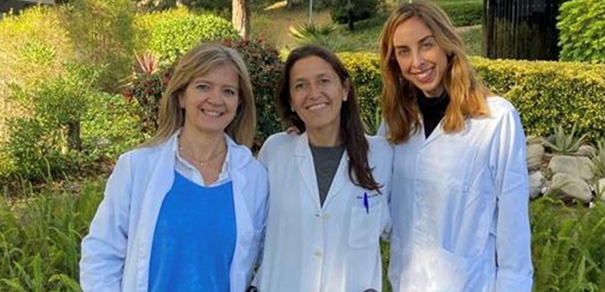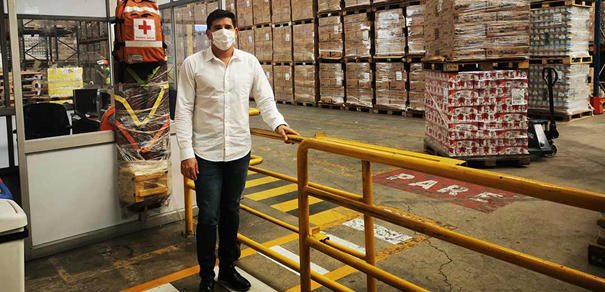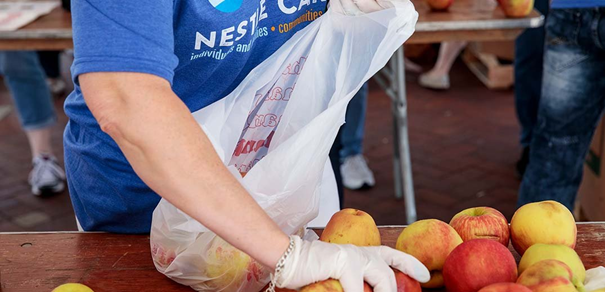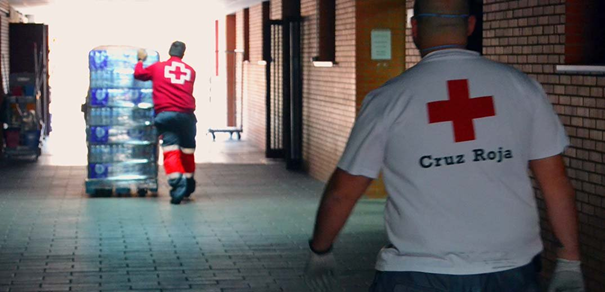How Nestlé Is Helping Feed the Hungry During the Pandemic
We're keeping factories open, donating food and money, and being there for the world
By Béatrice Guillaume-Grabisch, Head of Group Human Resources and Business Serv…
Pilar Bustamante felt the devastating effects of the pandemic this spring when she lost both of her parents to COVID-19.
In spite of this tragedy, Bustamante, a medical assistant at Nestlé-Spain, continued to work every day, answering questions from factory workers about how they could continue to produce food in a way that was safe for workers and consumers. Even through her grief, she knew the work was critical, not just for her coworkers, but for people around the world counting on Nestlé to provide the food they rely on.
"I both worked and lived through COVID, but it helped me to work every day and do my part," she said. "I needed to help people."
"Pilar was a champion," said Dr. Thaïs Giménez, her manager. "She was there for us, and it was very hard. And because of COVID, we couldn't even hug each other to comfort each other."
The long days and hard work paid off. Nestlé's production facilities stayed open, and products continued to find their way onto grocery store shelves. This is just one of countless examples of Nestlé teams around the world stepping up during this unprecedented time. Dedicated teams across our company managed supply chain challenges and the coronavirus's very real threat to our workforce. They did this as they also managed the strains in their own lives, as the pandemic descended on their communities.
"It's been a very hard year," said Oscar Maldonado, a distribution manager with Nestlé Peru. "It was bad in economic terms, but those are recoverable. We've come to appreciate our health." This year, Maldonado says, has given us "an opportunity to value all that we have."
As the surge in COVID-19 cases and the economic fallout of the pandemic persist, Nestlé and our employees have also been dedicated to helping the tens of millions struggling with hunger across the world, from Australia and Ethiopia to Peru and Yemen. "The biggest hidden consequence of the pandemic has been the hunger pandemic it has spawned," Mark Lowcock, the U.N.'s humanitarian affairs emergency and relief coordinator, recently told Voice of America.
At Nestlé, we're committed to doing our part to fight this growing crisis, not just through our day-to-day commitment to producing affordable food worldwide but also by increasing donations to organizations that are dedicated to fighting hunger. This work will continue and even expand in the new year.
Pandemic's cost
Even before the pandemic hit, almost 690 million people were undernourished, according to the World Health Organization. Food insecurity has soared, however, as the misery of COVID-19 has spread from nation to nation. In June, the World Food Program launched the biggest humanitarian effort in its history, providing assistance to 138 million people, up from 97 million people just a year earlier.
The statistics are sobering in both wealthy and low-income countries. Nearly 26 million Americans reported to the U.S. Census Bureau a lack of food to eat in the prior week. In Lebanon, the number of people in need of food doubled between 2019 and 2020. And in Nigeria, 70% of people were struggling with hunger, according to a Brookings Institute report.
Global problem, global solutions
As the world's largest food and beverage company, we know that we are uniquely positioned to help people in communities that span our business. That's why during this pandemic, we've been using our size and scale, as well as our compassion and commitment to social responsibility, to help alleviate this suffering that knows no borders.
Since March, Nestlé has provided support to those fighting the crisis with CHF 120 million in combined financial and in-kind donations across more than 50 countries to assist people and communities. We've partnered with the International Federation of Red Cross and Red Crescent Societies and the European Federation of Food Banks to provide help for emergency services. Additionally, Nestlé employees from around the world have given their own money to serve their local areas. Just this month, we launched an employee giving campaign in Europe. In the first week of the effort, employees contributed more than 23,000 euros.
Here are just a few of our programs that are making a difference:
- Honduras: Nestlé donated food to more than 100 organizations that provide care to children.
- Pakistan: We're proud to have provided 4 million servings of food and beverages to vulnerable populations.
- Peru: We supported the Hombro a Hombro initiative, which delivers non-perishable food and bottled water to vulnerable populations.
- Poland: We donated more than CHF 1 million of products to food banks here and in the Baltics.
- United Kingdom: We have signed the C19 Business Pledge and delivered GBP 4 million product donations to hospitals, charities, care homes and food banks.
- United States: Our businesses and employees have made USD 6.9 million in donations and provided 3.9 million pounds of food for people and pets in need.
"How can you not be proud to work at Nestlé?" said Andre Robins, Nestlé South Africa plant manager, reflecting on the company's work over the past 10 months.
As we look to the new year, we are hopeful that vaccines will bring an end to the virus' spread, but we also understand that the challenges of food insecurity will not end when the pandemic does. The world can count on Nestlé – and our employees – to do our part to fight hunger in 2021 and beyond.
Media contact: mediarelations@nestle.com





